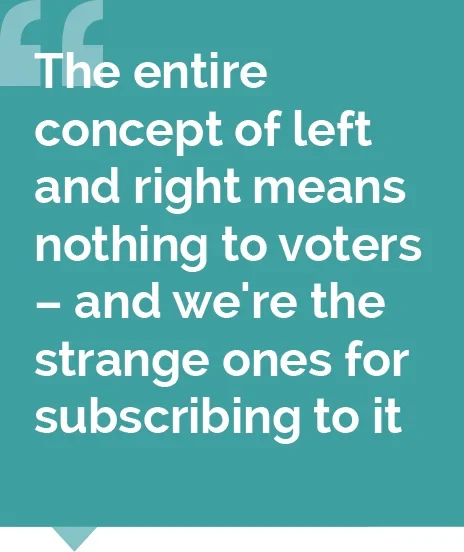James Frayne of Policy Exchange argues politicans need to start thinking like the voters themselves – and that means abandoning the traditional language of politics
It's commonplace to hear the opinion that those of us that work in and around Westminster are out of touch with ordinary voters. It's true; collectively we are out of touch. It's not just the language we use – when was the last time you heard a family member talk about "radical reform"? - but our policy priorities are often different too. However, the biggest difference we have with the mass of ordinary voters is in the overall framework in which we view the world.
Essentially, most of us in Westminster look at the world through a traditional ideological prism, where "left" and "right" actually mean something. For us, it seems natural, if we lean right, to believe in a small state, with lower taxes, choice in public services and a robust attitude to welfare reform and law enforcement. If we lean left, it seems natural to believe in an active role for the state, generous welfare, wholly state-run public services and a liberal attitude towards crime and justice and immigration.
And yet many, if not most, voters find this approach baffling. This was clear from the major study of the country's marginal seats that we conducted with YouGov before the election. This research programme made it clear that ordinary voters view politics and society entirely differently. They see the world through the prism of their fundamental values – above all, of family and fairness. The entire concept of left and right means nothing to them – and we're the strange ones for subscribing to it.

These two values - of family and fairness – were the stated top values of the voters that we polled in marginal seats and across the country too. These came well above those values that politicians traditionally seek to project – such as entrepreneurship and ambition. And these values clearly affect their views on pretty much every political issue you care to name.
This values-driven world view explains why ordinary voters hold what we in Westminster might perceive to be a set of contradictory positions on a range of issues. For example, many voters believe in an active role for Government, tougher sentencing, nationalising the public utilities, school discipline, welfare reform, more money for the NHS and tighter immigration laws – and they reject the power of choice and competition in public service reform. There are no politicians that subscribe to such a political platform, let alone any major party. They are a mix of traditionally left-wing and right-wing positions.
But viewed through the prism of family and fairness, they make complete sense. For most voters, running the NHS in its current form, keeping criminals locked up, improving school discipline and nationalising the utilities are about helping their own families - either by protecting them from harm or allowing them to better provide for them materially. Welfare reform and tighter immigration laws in the form of restricted benefits are about the creation of a society that is fair for all – and seen to be fair for all. While these voters can't therefore be understood through conventional ideological analysis, their views are part of a coherent whole.
Our research – which we enhanced with YouGov's extensive new databank, YouGov Profiles – shows that the group of voters that held these values of family and fairness particularly tightly were C1/C2 voters. These voters make up nearly half the population as a whole and, crucially, they make up more than half of the population of the overwhelming majority of England's marginal seats. They're the voters that really decide the outcome of General Election campaigns and the ones that politicians must prioritise in their campaigning.
In seeking to secure their votes – which have been split in past elections between Labour and the Conservatives – it's essential that politicians think about politics in a different way. If politicians endlessly seek to place voters on a linear scale between left and right, the reaction of the public to particular events or policy announcements won't make any sense. Rather, they need to get into the same mindset of the voters themselves – and start to look at the world through the prism of values like family and fairness.
James Frayne is Director of Policy & Strategy at Policy Exchange. He is the author of “Meet the People”, which explains what organisations can learn from political campaigns in their reputation management.






